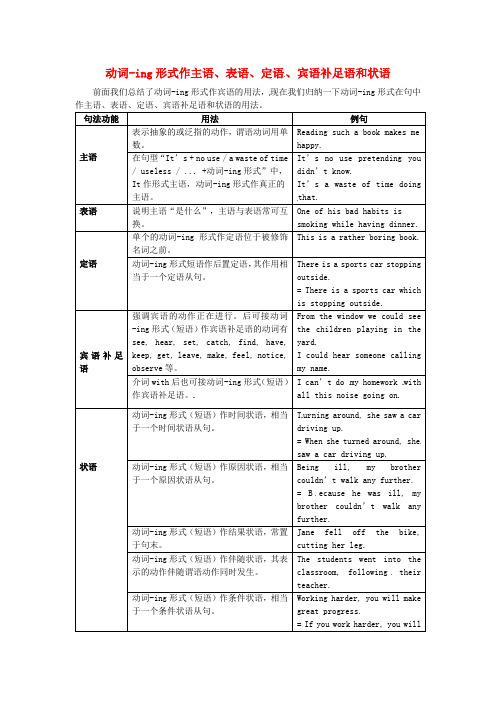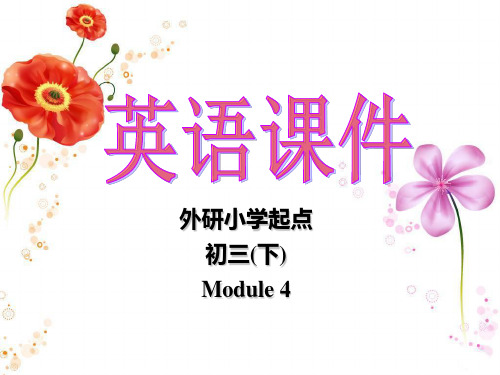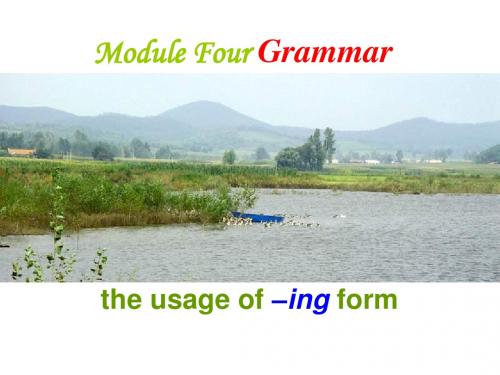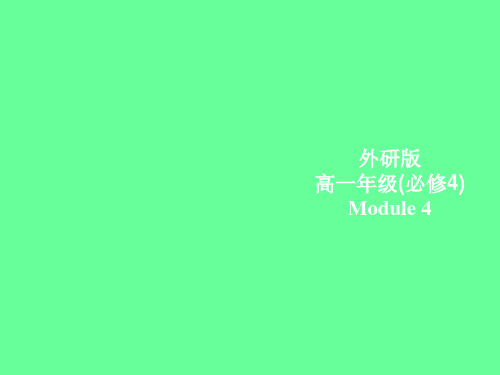Module 4 Grammar
module4Grammar

将来 一般将来时 I will be asked. 过去将来时 I would be asked.
有关被动语态的几个问题:
1) “be + 过去分词” 并非都是被动语态, 系动词 be, feel, seem,look,等词后面 的过去分词已转化为形容词,作表语用, 表示某种状态。 I‘m interested in mathematics. He seems unsatisfied with his work.
10. The construction of the two railway lines ____ by now. (2006陕西) A. has completed B. have completed C. have been completed D. has been completed
Homework
高考链接
1. ---Your job ___ open for your return. ---Thanks. (2006北京) A. will be kept B. will keep C. had kept D. had been kept 2. I have to go to work by taxi because my car ____ at the garage. (2006重庆) A. will be repaired B. is repaired C. is being repaired D. has been repaired
现在完成时的被动语态:has/have+been+过去分词
过去完成时的被动语态:had+been+过去分词
Grammar-4 Rewrite the sentences in the passive voice.
18-19 Module 4 Section Ⅲ Grammar——时间状语从句和省略

18-19 Module 4 Section ⅢGrammar——时间状语从句和省略while 从句谓语用延续性动词表示两个延续性动作同时发生且具有对比意味,或一个动作发生在另一个动作进行的过程中as 强调主、从句动作同时发生表示“一边……一边……”之意他父亲去世时他才九岁。
Jack was working in the lab when the power cut occurred.杰克正在实验室里工作,这时突然停电了。
They arrived while we were having dinner.他们到时我们正在吃晚饭。
While I played the piano,my sister did her homework.我弹钢琴的时候姐姐在做作业。
As years go by,China is getting stronger and richer.随着时间一年一年过去,中国变得越来越富强了。
I saw my mother as I was getting off the bus.我下公共汽车的时候看见了我妈妈。
[名师点津]when在be about to do...when...,be doing...when...,had done...when...,be on one's way...when...,be on the point of doing...when...等结构中,作“正在那时”讲,表示某个动作正在发生或刚刚发生,另一动作同时发生。
He was about to leave when someone knocked at the door.他刚要离开就有人敲门。
[即时演练1]选词填空:when,while,as①It's much easier to make friends when you have similar interests.②While/When in Vienna he studied music.③You will grow wiser as you grow older.2.until,till的用法主句形式主句谓语意义肯定句用延续性动词意为“直到……为止”,表示主句中的动作到从句动作发生时结束否定句用短暂性动词意为“直到……才……”,表示主句中的动作到从句动作发生时开始He waited until she had finished speaking.他一直等到她讲完。
高中英语Book2Module4Grammar-动词-ing形式作主语、表语、定语、宾语补足语和状语讲练外研版必修2

动词-ing形式作主语、表语、定语、宾语补足语和状语前面我们总结了动词-ing形式作宾语的用法,现在我们归纳一下动词-ing形式在句中作主语、表语、定语、宾语补足语和状语的用法。
句法功能用法例句主语表示抽象的或泛指的动作,谓语动词用单数。
Reading such a book makes mehappy.在句型“It’s + no use / a waste of time/ useless / ... +动词-ing形式”中,It作形式主语,动词-ing形式作真正的主语。
It’s no use pretending youdidn’t know.It’s a waste of time doingthat.表语说明主语“是什么”,主语与表语常可互换。
One of his bad habits is smoking while having dinner.定语单个的动词-ing形式作定语位于被修饰名词之前。
This is a rather boring book.动词-ing形式短语作后置定语,其作用相当于一个定语从句。
There is a sports car stoppingoutside.= There is a sports car whichis stopping outside.宾语补足语强调宾语的动作正在进行。
后可接动词-ing形式(短语)作宾语补足语的动词有see, hear, set, catch, find, have,keep, get, leave, make, feel, notice,observe等。
From the window we could seethe children playing in theyard.I could hear someone callingmy name.介词with后也可接动词-ing形式(短语)作宾语补足语。
I can’t do my homework withall this noise going on.状语动词-ing形式(短语)作时间状语,相当于一个时间状语从句。
Module 4 Grammar课件(共18张PPT)2022-2023学年外研版英语九年级上册

很难说哪种养育方式 ( parenting style) 更好,但是好的养育应 该在保护孩子和放手(letting go)之间找一个平衡点(balance)。
It's hard to say which parenting style is better, but good parenting needs to find a balance between protecting children and letting go.
在中国,父母们花费2-5万元在孩子的暑假上。
In China, parents spend 20,000 yuan to 50,000 yuan on their children's summer vacation.
Part 3 More Practice Ⅰ. Translation.
P37
他们想让他们的孩子尽可能的去享受假期。
Parents drive their teenagers into the middle of a forest and then leave them there. Let them look for the way home.
Part 3 More Practice Ⅰ. Translation.
and started waving my arms in front of my mum’s face and finally she asked what I
wanted. So I said if Mrs. Barb needed someone to watch her kids. I would love to do
Grammar-介词

指着 赶上
嘲笑 同意……的意见 请求
用……装满
23. be made of/from 由……制成
24. base on
25. come up with
26. do well with 27. speak highly of 28. think of 29. think about
以……为根据 找到 在……方面干得好
18. on one’s way __ to 19. do something _______ your around neighborhood 20. ___ the Internet on
另一方面 有时 顺便说一下 匆忙地 同时 坐飞机
名胜 在……几岁时
23. on show 25. around your neighbourhood
展览
在你周围
24. at the beginning of 在……的开始
与动词搭配
1. quarrel with 2. take care of
和……吵架 照顾 等待 阻止……做
since 自…...以后, 自…...以来
与名词搭配 1. with the help of 在……的帮助下 在地球上 2. on earth
3. after a while 4. in front 5. on duty
过了一会
前方
值日
6. on one’s way to 在去……的途中
7. to one’s surprise
常用介词
about 关于, 附近, 大约, 周围, 随身
above 在......上, 以上, 超过, 在......上游 across 横过, 对面, 交叉, 在......的对面 after 在......后面, 依照 against 撞到, 靠着, 反对, 违背
Book 5 Module 4 Grammar 的教学设计

Book 5 Module 4 Grammar的教学设计同心中学妥万国Teaching AimsTo help students revise the passive voice; raise students’ realization of cooperation; train students’ ability of expression.Main pointsThe definition of the passive voiceThe structure of the passive voice in different tenseTeaching methodTask: students finish different tasks under teacher’s guideTeaching mediatextbook, computer, big screenTeaching processLead-inT: Girls and Boys, I’m lucky today, because I’m chosen to give you a lesson. You are lucky, too. Because you are chosen to have my class.目的:让学生初步认识被动语态的应用PresentationDefinition:英语的语态共有两种:主动语态和被动语态。
主动语态表示主语是动作的执行者,被动语态表示主语是动作的承受者.被动语态的构成:被动语态由"助动词be+及物动词的过去分词"构成。
被动语态的时态变化只改变be的形式,过去分词部分不变一般现在时:am/is/are + 过去分词一般过去时: was/were +过去分词一般将来时: will be +过去分词过去将来时:would be +过去分词现在进行时: am/is/are + being +过去分词过去进行时: was/were + being +过去分词现在完成时: have/has + been +过去分词过去完成时: had +been +过去分词含有情态动词的被动语态:情态动词+ be +过去分词目的:给学生一个完整,系统的被动语态的定义和结构Activity 1目的:结合上一步帮学生回忆被动语态的基本表现,并检查学生的判断能力。
高一英语module-four-grammar(201908)

(3). 在it作形式主语的句中,若表语是 necessary, important等形容词时,后 面只用不定式,若表语是no use, no good, a waste of time 时,常用动名词。
①It is necessary to spend enough time on English if you want to learn it well.
Module Four Grammar
the usage of –ing form
1. 动名词与不定式作主语
(1). 表示一般抽象概念均可。
Reading/ To read good books enriches our mind. (2). 表具体的特定情况或有待于完成的 动作,常用不定式。
Swimming is good for health, but to swim in such a polluted river is harmful to health.
②It is no use at all arguing with him about it.
; 新风系统 / 新风系统 ;
大马死 至杨骏肆逆 幽然深远 咨余不造 郁若云布 郡国八陨霜 近有所漏者 虽夺其服 父子分离 请官属会议 不违其志 昔魏武帝置都督 又以威德服物 三年正月丙辰 居丧毁瘁 垂拱仰办 明帝太宁元年十二月 穆 阳伏而不能出 璪 十一年五月 荆州人为祜讳名 阶庭空虚 减枭斩族诛从坐 之条 是月 钟会 行十馀里 得征瑞印绶 有六子 皆其主兴废之应也 远客朝见 疆埸之间 叔父骏女男胤有德色 丝竹尽当时之选 而女独婴戮于二门 茕茕在疚 在外诸军已潜欲攻会 纳俊兄虞女粲于后宫为夫人 蒺藜有刺 将非以德掩其言乎 崔瑗作《草书势》曰 拜相国从事中郎 冲以儒雅为 德 卿可为求佳对 帝风流靡 所以
Module4-Grammar

He does nothing but complain. 她什么都不做,只是抱怨。 The workers do nothing but drink tea and talk to each other. 工人们什么都不做,只是喝茶聊天。 He had no choice but to accept the fact. 她别无选择,只有接受事实。
Infinitive
Observation
1. I’m glad to meet you. 2.She invited me to attend the meeting. 3.The boy is old enough to go to school.
to do 表示主动
1. There was nothing to be done. 2. I’d like to be told what’s going on. 3. Nothing is allowed to be taken out of the reading room.
英语:Module4《Great Scientists》Grammar(1)(外研版必修4)

短语动词的被动语态: 短语动词的被动语态: That old man was often laughed at. The doctor has been sent for. 结论: 结论 短语动词在主动结构中是一个不可分 割的词组, 在被动结构中也是如此,不 割的词组 在被动结构中也是如此 不 可去掉后面的介词或副词。 可去掉后面的介词或副词。
5. The construction of the two new railway lines _______ by now. [2006 陕西卷 陕西卷] A. had completed B. have completed C. have been completed D. has been completed
We elected him our monitor. He was elected our monitor by us. We saw him sitting there without doing anything. He was seen sitting there without doing anything. 结论:带有宾语补足语的动词的被动 结论 带有宾语补足语的动词的被动 语态原来的宾语补足语变为主语补 语态原来的宾语补足语变为主语补 足语。 足语。
9. — Do you have any problems if you _____ this job? — Well, I’m thinking about the salary ... A. offer C. are offered (湖南 湖南2008) 湖南 B. will offer D. will be offered
1. He must be prevented from going. 2. The plan ought to be put into practice as soon as possible. 结论: 结论 含有情态动词的被动语态的结 构为: 情态动词 情态动词+be+动词过去分词” 动词过去分词” 构为 “情态动词 动词过去分词
Module 4 Grammar Time adverbial clause时间状语从句课件

Mary在发言时Tony突然插话!
我们在学校操场上的活动刚结束突然就下起了大雨
2.before, since引导时间状语从句的用法:①We must leave our dormitory before the dormitory teachers close the gate at 7:15 在寝室老师在7点15分关门前,我们必须离开寝室。 ②Tony broke in before Mary could finish her words. Mary还来不及说完Tony就插嘴了。 ③Study English hard before it is too late! 趁还不是太晚,努力学习英语吧。④Cath hasn’t phoned since she went to Berlin. Cath自从去了柏林还没有打来过电话。
外研版高一英语必修2_Module4_Grammar_公开课课件

It is no use/useless/no good/ no value/nice/worth/a waste of time doing something
Correct the mistakes. 1. It is no use(good) to cry after failure.
crying
1.to do 和-ving用法有什么区别?
思考 A. 主动 进行; 用途; 抽象 习惯性动作 B.具体或将来 2.以上 to do和-ving在句中分别做什么成分?做宾语的是第
_2__句。
Class inquiry 1 ---to do and –ving used as object
1. I can’t imagine l_i_v_i_n__g(live) in a lonely place. 2. You should avoid _m__a_k__i_n_g_(make) the same mistake . 3. I’m looking forwart toh_e_a__r_i_n_g_(hear) from you.
B.hope wish expect agree learn fail decide plan promise refuse manage offer would like(love)等
C.begin start continue
D. remember forget regret stop go on mean try等
E. need require want
____A____跟动词-ving形式做宾语
__B______ 跟to do 做宾语
____C____跟to do和-ving形式做宾语意义无区别的
高二英语外研版教师用书:Module4SectionⅢGrammar含解析

现在完成进行时语境自主领悟先观察原句后自主感悟1。
In 1996 , I moved to Canada withmy husband and I have been living there since then。
2.Liu Fang has been playing the pipa for the last three hours.3。
She's been performing concerts every day since last month。
4.They have known each other since childhood。
5。
I have traveled to most of the cities in China since five years ago.1.句1、句2和句3用了现在完成进行时;句4和句5用了现在完成时.2。
由左栏各句可知,现在完成进行时的构成为:have/has+been +动词的现在分词形式;现在完成时的构成为:have/has+动词的过去分词形式。
一、现在完成进行时1.构成have/has+been+动词的现在分词形式。
2.用法(1)表示过去某一时刻发生的动作一直持续到现在,并有可能继续持续下去。
He has been playing computer games all day。
他一天都在玩电脑游戏。
I have been working for this company for three years.我在这个公司已工作三年了。
(2)表示某一动作从过去开始,一直持续到说话时刚刚结束。
Sorry!I’m late.How long have you been waiting for me?对不起!我来迟了。
你等了我多长时间?(3)表示一直到说话时为止的一段时间内一再重复发生的动作。
The teacher has been telling us to be careful all the term。
- 1、下载文档前请自行甄别文档内容的完整性,平台不提供额外的编辑、内容补充、找答案等附加服务。
- 2、"仅部分预览"的文档,不可在线预览部分如存在完整性等问题,可反馈申请退款(可完整预览的文档不适用该条件!)。
- 3、如文档侵犯您的权益,请联系客服反馈,我们会尽快为您处理(人工客服工作时间:9:00-18:30)。
5.I feel greatly honored________ into their society. A.to welcome C.to be welcomed B.welcoming D.Welcomed
6.If there’s a lot of work________, I’m happy to just keep on until it
主语(subject)
2.My dream is to go college
some day.
表语(predicate)
3.They wanted to help me .
宾语(object)
4.Would you like something to eat ?
定语(attribute)
5.They run over to welcome the
foreign visitors.
状语(adverbial)
6.Our teacher asked us not to talk
in the class.
补语(complement)
The function of the -ing form
1. Eating too much is bad for your health.
主语(subject)
2. His job is selling computers.
表语(predicate)
3. She likes reading newspaper after supper .
宾语(object)
4. He may be in the reading
room.
定语(attribute)
is finished.
A.to do B.to be doing
C.done
D.doing
pretend, demand,fear,intend,
plan,refuse,attempt,desire,
manage, pretend,promise, desire等。
1. ________it with me should be a good choice. Trust me. A.When left B.Leaving C.If you leave D.Leave 2.The fruit________fresh in his fruit stand sells well. A.looking B.looked C.look D.to be looked
3. ________in a wellknown university is what everybody wishes for. A.Educated B.Being educated C.To educate D.Educating 4. —Would you like to go fishing with me? —Sorry,but I have a lot of clothes________. A.wash B.washed C.washing D.to wash
The function of the infinitive and the
–ing form
作用
主语
种类 不定式
宾语
表语
定语
状语
补语
√
√
√
√
√
√
动名词
√
√
√
√
×
×
后面常跟不定式的动词有:
afford,expect,hope,wish,
hesitate, prepare,agree,
decide,determine,fail,offer,
Module 4 Fine Arts--Western, Chinese and Pop Arts
•Grammar
-Ing form and the infinitive
The function of the infinitive
1.To say is easy, but to do is
difficult .
